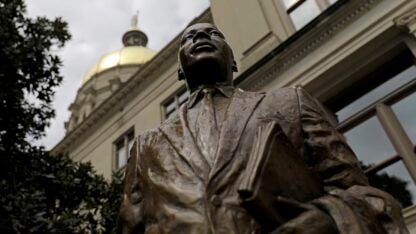Updated at 4:06 p.m.
A dispute over whether Black people were stricken from the jury pool because of their race has disrupted seating a final jury in the trial over the killing of Ahmaud Arbery.
Attorneys narrowed a pool of 48 people to 12 final jurors Wednesday. Minutes after they did, prosecutor Linda Dunikoski announced that only one of those 12 jurors was Black and the rest were white. She challenged defense attorneys’ decisions to eliminate seven Black panelists from the jury pool, saying they were based on race.
Laura Hogue, an attorney for defendant Greg McMichael, denied race was considered. She said those jurors showed bias in their answers to attorneys’ questions in the past two weeks. Judge Timothy Walmsley has yet to rule.
______________________________________________________________________________________________________
Attorneys began the final step Wednesday to seat a jury for the trial of three white men who chased and killed Ahmaud Arbery, the 25-year-old Black man whose slaying stunned people nationwide and roused such strong emotions at home that finding impartial jurors took more than two weeks.
A group of 65 potential jurors deemed by the judge to be fair-minded enough to serve returned to the Glynn County courthouse, where prosecutors and defense attorneys needed to narrow the pool down to a final jury of 12, plus four alternate jurors.
“We are going to narrow the pool of potential jurors into a final jury,” Superior Court Judge Timothy Walmsley told the first group at about noon Wednesday.
Then a bailiff passed a list of the potential jurors back and forth between the prosecutors and the three defense teams. Lawyers used the list to silently choose people to strike from the jury, which they can do for any strategic reason other than cutting someone solely based on race.
The final process of elimination was expected to take longer than usual. The judge planned to bring the jury pool into court in three separate panels to allow for social distancing as a safeguard against coronavirus infections.
Court was delayed Wednesday morning by last-minute objections to a few jury pool members. The judge agreed to dismiss one potential juror who had posted TikTok dance videos in tribute to Arbery.
The judge said he hopes to begin the trial Thursday with opening statements from prosecutors and lawyers for the three defendants.
Arbery’s death on Feb. 23, 2020, became part of the broader reckoning on racial injustice in the criminal legal system after a string of fatal encounters between Black people and police — George Floyd, Breonna Taylor and Rayshard Brooks, among others.
Greg McMichael and his adult son, Travis McMichael, armed themselves and pursued Arbery in a pickup truck after they spotted him running in their neighborhood. A neighbor, William “Roddie” Bryan,” joined the chase in his own truck and took cellphone video of Travis McMichael shooting Arbery three times with a shotgun.
No one was charged in Arbery’s death until more than two months later, when the video of the shooting leaked online. The Georgia Bureau of Investigation took over the case from local police and soon arrested all three men on charges of murder and other crimes.
Defense attorneys say the McMichaels and Bryan committed no crimes. They say Arbery had been recorded by security cameras inside a nearby house and they suspected him of stealing. Greg McMichael told police his son opened fire in in self-defense after Arbery attacked with his fists and grappled for Travis McMichael’s shotgun.
Investigators have said Arbery was unarmed and there’s no evidence he had stolen anything.
The slaying dominated news coverage and social media feeds in coastal Glynn County, home to 85,000 people south of Savannah. That caused court officials to take extraordinary steps in hopes of seating an impartial jury.
They mailed 1,000 jury duty notices, and nearly 200 people were questioned by the judge and attorneys at the courthouse during jury selection.
For a deeper exploration of Ahmaud Arbery’s story, listen to WABE’s podcast, “Buried Truths.” Hosted by journalist, professor, and Pulitzer-prize-winning author Hank Klibanoff, season three of “Buried Truths” explores the Arbery murder and its direct ties to racially motivated murders of the past in Georgia.









